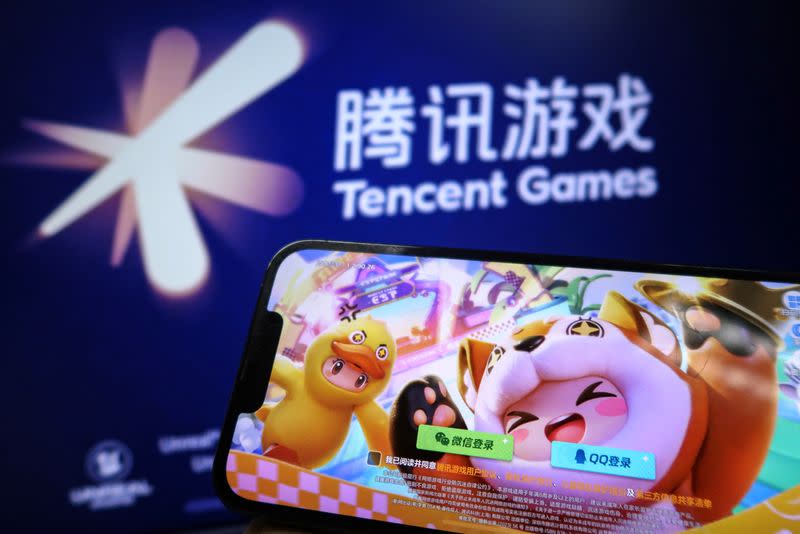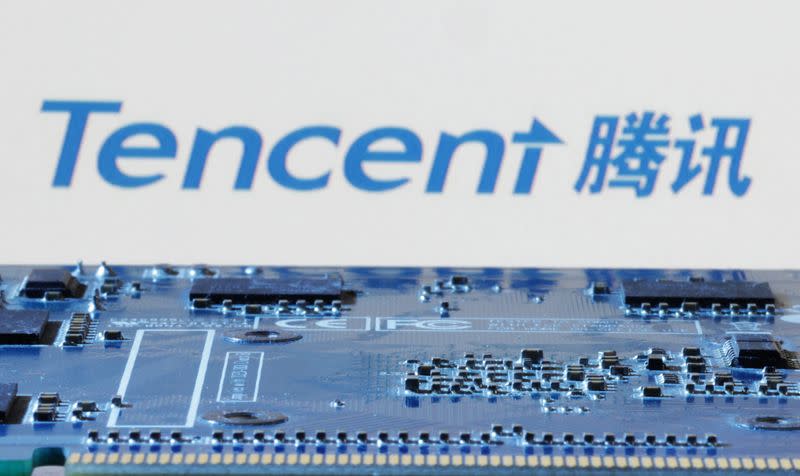China's Tencent Q1 revenue tops forecasts as ad sales, business services shine
By Josh Ye
HONG KONG (Reuters) -China's Tencent Holdings posted a 6% rise in first-quarter revenue on Tuesday, beating analyst expectations, on strong growth in advertising sales and business services.
However, a recovery in its games business, which generates nearly half of its profit, remained weak, pointing to challenges for the world's largest video game company as it seeks to boost the popularity of games in its portfolio. China's biggest internet company and operator of the WeChat messaging platform said revenue reached 159.5 billion yuan ($22.04 billion) for the three months ended March 31. That compared with the 158.44 billion yuan average of 19 analyst estimates compiled by LSEG.
It's the fifth straight quarter of revenue growth as the company recovers from a regulatory crackdown by Beijing in 2022.
As sales were the highlight in the quarter, with revenue jumping 26% to 26.5 billion yuan after Tencent upgraded its ad infrastructure and further commercialised its short video platform WeChat Video Accounts, a rival to ByteDance' TikTok-like app Douyin in China.
"We upgraded our advertising technology platform to help advertisers establish advertising campaigns more effectively, and made generative AI-powered advertising creation tools available to all advertisers," Tencent's chief strategy officer James Mitchell said on an earnings call on Tuesday.
However, Mitchell was more cautious about the outlook, saying he expected advertising growth to be less rapid in subsequent quarters.
"Given the economy is mixed, advertiser sentiment is also quite mixed, and it's certainly a challenging environment in which to start advertising," he said.
Tencent's core gaming business has slowed as the popularity of its existing hit titles plateaus and fades.
For the first quarter, domestic gaming revenue declined 2% to 34.5 billion yuan. Revenue declined at both Honor of Kings and Peacekeeper Elite, Tencent's two leading titles.
REJUVENATING GAME TITLES
To address the issue, Mitchell said the company has been rejuvenating some of its key games and that he was confident in progress on that process.
Analysts say upcoming games including the "Dungeon and Fighter" mobile game, which has taken Tencent seven years to develop and secure regulatory approval, will provide a boost to Tencent's gaming revenue for the coming quarters.
Meanwhile, international gaming revenue returned to growth this quarter, up 3% year-over-year to 13.6 billion yuan.
Revenue from fintech and business services, the third pillar of Tencent's revenue, grew 7% to 52.3 billion yuan as the firm's suite of payment, ecommerce and productivity software and services continued to gain traction in China.
However, Tencent President Marin Lau said China's sluggish economy is causing headwinds for the company's fintech growth.
"As a whole, the government is actually putting a lot of stimulus to revive the economy, to revive consumption confidence. We think at some point of time this headwind will actually turn," he said, "But before it turns... our fintech revenue on the payment side will be slow in terms of growth."
Net profit rose 62% to 41.8 billion yuan, versus the 43.03 billion yuan average analyst estimate.
Shawn Yang, a senior research analyst at Arete Research, said he expected gaming revenue to be weak in the first quarter, but added it would likely improve from March and the second quarter.
"They are having a new game from Supercell and the new Dungeon and Fighter game is coming," he said, "Revenue from Honor of Kings and Peacekeeper Elite may also stabilise then."
Reuters reported last month that Tencent is seeing a major shift of its gaming strategy where it is now focusing more on developing homegrown games than adapting old foreign hits for smartphones.
Pony Ma, Tencent's founder and chief executive, has been blunt that the company's video game division - which last year generated 180 billion yuan in sales or around 30% of overall revenue - needs to do better.
($1 = 7.2378 Chinese yuan)
(Reporting by Josh Ye; Editing by Jacqueline Wong and Sharon Singleton)



